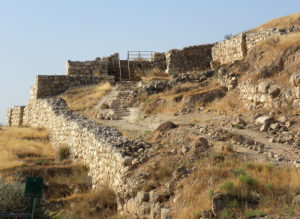 TEL LACHISH, Israel – Archaeologists digging out the ruins of an enormous ancient gate in Israel have discovered evidence that confirms one of the Old Testament’s historical accounts of King Hezekiah.
TEL LACHISH, Israel – Archaeologists digging out the ruins of an enormous ancient gate in Israel have discovered evidence that confirms one of the Old Testament’s historical accounts of King Hezekiah.
In January of this year, archaeologists began an archaeological excavation in Tel Lachish National Park, which is located in central Israel about 25 miles southwest of Jerusalem. The park marks the site of the ancient city of Lachish, which is mentioned nearly two dozen times in the Bible and played a role in several biblical accounts.
Described by some archaeologists as the most important city in Judah after Jerusalem, Lachish was a prosperous and heavily-fortified center until the Assyrians destroyed it around 700 B.C.
Several decades ago, researchers partially uncovered the remains of an ancient gate at Lachish that is believed to be nearly 3,000 years old, dating back to Lachish’s prime during the First Temple period (1000-600 B.C.). City gates were important places in Bible times, because city leaders and government officials would regularly convene there.
During this year’s expedition, archaeologists with the Israel Antiquities Authority set out to uncover the rest of the Lachish city gate. What they discovered was, in the words of one member of their team, “fascinating.”
By completely uncovering the gate of Lachish, the archaeologists discovered that it is the largest such gate ever discovered in Israel, measuring 80 feet by 80 feet, with a preserved height of over 13 feet. Inside of the gate are six chambers, three on each side, with the city’s main street passing between them. A number of artifacts were also found within the chambers.
In addition, the research team found evidence of pagan worship within the gate.
“Steps to the gate-shrine in the form of a staircase ascended to a large room where there was a bench upon which offerings were placed,” explained Sa’ar Ganor, director of the excavation, in a statement. “An opening was exposed in the corner of the room that led to the holy of holies; to our great excitement, we found two four-horned altars and scores of ceramic finds consisting of lamps, bowls and stands in this room.”
However, the archaeologists noticed an intriguing detail: the altar’s horns had been intentionally cut by someone. They believe this is evidence of events detailed in 2 Kings 18.
“It is most interesting that the horns on the altar were intentionally truncated!” Ganor said in the statement. “That is probably evidence of the religious reform attributed to King Hezekiah, whereby religious worship was centralized in Jerusalem and the cultic high places that were built outside the capital were destroyed.”
According to 2 Kings 18, King Hezekiah destroyed the altars and pagan idols that the Israelites had been worshipping. The damaged altar in the ruins of the Lachish gate provide tangible evidence of Hezekiah’s actions.
“This discovery is an illuminating example of the verse that described King Hezekiah: ‘He removed the high places, smashed the sacred stones and cut down the Asherah poles…’ (II Kings 18:4),” stated Ze’ev Elkin, the Minister of Jerusalem and Heritage and Environmental Protection. “Before our very eyes these new finds become the biblical verses themselves and speak in their voice.”
The archaeologists also uncovered a stone toilet in one of the gate’s chambers. It was likely placed there to desecrate the altar, much like Jehu desecrated a house of Baal by converting it to a latrine (2 Kings 10:27).
“This is the first time that an archaeological find confirms this phenomenon,” the Israel Antiquities Authority noted.
Time and again, archaeology confirms the Bible’s historical accounts, Elkin said.
“The fascinating new discovery at Tel Lachish is a typical example whereby excavations and further research of heritage sites show us time and time again how biblical tales that are known to us become historical and archaeological stories,” he stated.
A special message from the publisher…
 Dear Reader, our hearts are deeply grieved by the ongoing devastation in Iraq, and through this we have been compelled to take a stand at the gates of hell against the enemy who came to kill and destroy. Bibles for Iraq is a project to put Arabic and Kurdish audio Bibles into the hands of Iraqi and Syrian refugees—many of whom are illiterate and who have never heard the gospel.Will you stand with us and make a donation today to this important effort? Please click here to send a Bible to a refugee >>
Dear Reader, our hearts are deeply grieved by the ongoing devastation in Iraq, and through this we have been compelled to take a stand at the gates of hell against the enemy who came to kill and destroy. Bibles for Iraq is a project to put Arabic and Kurdish audio Bibles into the hands of Iraqi and Syrian refugees—many of whom are illiterate and who have never heard the gospel.Will you stand with us and make a donation today to this important effort? Please click here to send a Bible to a refugee >>



